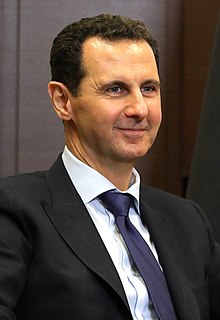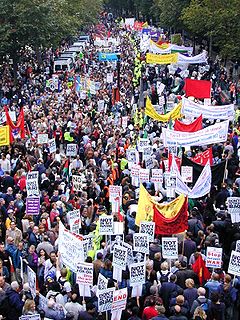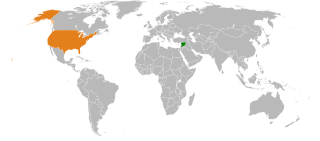
Beginning in late 2002, and continuing after the 2003 invasion of Iraq, large-scale protests against the Iraq War were held in many cities worldwide, often coordinated to occur simultaneously around the world. After the biggest series of demonstrations, on February 15, 2003, New York Times writer Patrick Tyler claimed that they showed that there were two superpowers on the planet: the United States and worldwide public opinion.

Bashar Hafez al-Assad is a Syrian politician who has been the 19th president of Syria since 17 July 2000. In addition, he is the commander-in-chief of the Syrian Armed Forces and regional secretary of the Arab Socialist Ba'ath Party's branch in Syria. His father, Hafez al-Assad, was the president of Syria before him, serving from 1971 to 2000.

On 15 February 2003, a coordinated day of protests started across the world in which people in more than 600 cities expressed opposition to the imminent Iraq War. It was part of a series of protests and political events that had begun in 2002 and continued as the war took place. At the time, social movement researchers described the 15 February protest as "the largest protest event in human history".

Diplomatic relations between Syria and the United States are currently non-existent; they were suspended in 2012 after the onset of the Syrian Civil War. Priority issues between the two states include the Arab–Israeli conflict, the Golan Heights annexation, and the Iraq War.

The Embassy of Syria in London was the diplomatic mission of the Syrian Arab Republic to the United Kingdom. The chancery is located at 8 Belgrave Square of London.

The Syrian civil war is an ongoing multi-sided civil war in Syria fought between the Ba'athist Syrian Arab Republic led by Syrian president Bashar al-Assad, along with domestic and foreign allies, and various domestic and foreign forces opposing both the Syrian government and each other in varying combinations.
Beginning on March 19, 2011 and continuing through the 2011 military intervention in Libya, anti-war protests against military intervention in Libya were held in many cities worldwide.
The following is a timeline of the Syrian Civil War from May to August 2011, including the escalation of violence in many Syrian cities.
International reactions to the Syrian Civil War ranged from support for the government to calls for the government to dissolve. The Arab league, United Nations and Western governments in 2011 quickly condemned the Syrian government's response to the protests which later evolved into the Syrian Civil War as overly heavy-handed and violent. Many Middle Eastern governments initially expressed support for the government and its "security measures", but as the death toll mounted, especially in Hama, they switched to a more balanced approach, criticizing violence from both government and protesters. Russia and China vetoed two attempts at United Nations Security Council sanctions against the Syrian government.

The Siege of Hama (2011) was among the nationwide crackdowns by the Syrian Government during the early stage of the Syrian Civil War. Anti-government protests had been ongoing in the Syrian city of Hama since 15 March 2011, when large protests were first reported in the city, similar to the protests elsewhere in Syria as part of the wider Syrian Civil War. The events beginning in July 2011, were described by anti-government activists in the city as a "siege" or "blockade".
Protests began in Syria as early as 26 January 2011, and erupted on 15 March 2011 with a "Day of Rage" protest generally considered to mark the start of a nationwide uprising. The Syrian government's reaction to the protests became violent on 16 March, and deadly on 18 March, when four unarmed protesters and seven police were killed in Daraa.
The following is a timeline of the Syrian uprising from September to December 2011. This period saw the uprising take on many of the characteristics of a civil war, according to several outside observers, including the United Nations Commission on Human Rights, as armed elements became better organized and began carrying out successful attacks in retaliation for the ongoing crackdown by the Syrian government on demonstrators and defectors.
Mohamad Anas Haitham Soueid is a Syrian-born naturalized United States citizen and a resident of Leesburg, Virginia who was indicted on espionage-related charges by federal prosecutors in October 2011. Soueid, 47 years old, is accused of passing information about Syrian American protesters in the United States to the government of Syrian President Bashar al-Assad, who are thought to have arrested and tortured numerous Syrian political refugees' family members and associates living in Syria.
On 6 January 2012, a bomb exploded in the Al-Midan district of Damascus, Syria. According to the Syrian government, a suicide bomber attacked buses carrying riot police shortly before an anti-government protest was to begin. It said that 26 people were killed and over 60 were injured. Most of the victims were civilians, though the Syrian government showed footage of what it claimed to be the funeral of 11 police officers killed in the attack.

The Syrian Civil War is an intensely sectarian conflict. The focus of the conflict has been identified by some as a ruling minority Alawite government and allied Shi'a governments such as Iran, pitted against the country's Sunni Muslim majority who are aligned with the Syrian opposition and their Sunni Turkish and Persian Gulf state backers. Others, such as the blogger Neil Clarke, identify it as the secular Syrian government, made up of all religious groups pitted against the Islamist opposition. However, Sunni Muslims make up the majority of the Syrian Arab Army and many hold high governmental positions, while Alawites and members of almost every minority have also been active on the rebel side.
This article details responses from Syrian government officials to widespread civil unrest which began in early 2011 and eventually unraveled into nationwide civil war.

Foreign involvement in the Syrian Civil War refers to political, military and operational support to parties involved in the ongoing conflict in Syria that began in March 2011, as well as active foreign involvement. Most parties involved in the war in Syria receive various types of support from foreign countries and entities based outside Syria. The ongoing conflict in Syria is widely described as a series of overlapping proxy wars between the regional and world powers, primarily between the US and Russia as well as between Iran and Saudi Arabia.

The civil uprising phase of the Syrian Civil War, or as it was sometimes called by the media, the Syrian Revolution, was an early stage of protests – with subsequent violent reaction by the Syrian Arab Republic – lasting from March to 28 July 2011, as part of the wider spread Arab Spring in the Arab world. The uprising, initially demanding democratic reforms, evolved from initially minor protests, beginning as early as January 2011 and transformed into massive protests in March.
The Stop the War Coalition (StWC), informally known simply as Stop the War, is a British group established on 21 September 2001, shortly after the September 11 attacks, to campaign against what it believes are unjust wars.
The 2020 Suweida protests were a series of protests against the government of Syrian President Bashar al-Assad in the Druze-majority southern Syrian city of Suweida.











